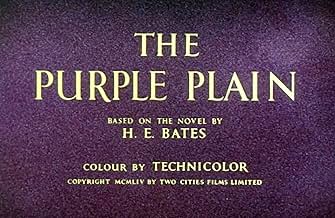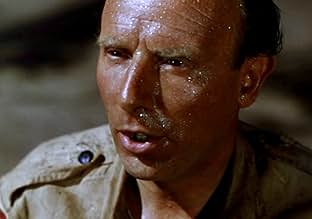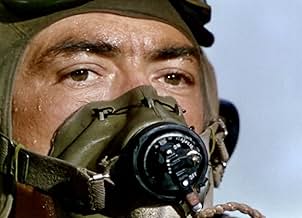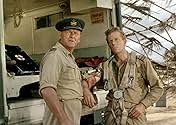NOTE IMDb
6,5/10
2,6 k
MA NOTE
Ajouter une intrigue dans votre langueIn World War II Burma, a Canadian bomber pilot becomes reckless after losing his bride in a Luftwaffe air raid.In World War II Burma, a Canadian bomber pilot becomes reckless after losing his bride in a Luftwaffe air raid.In World War II Burma, a Canadian bomber pilot becomes reckless after losing his bride in a Luftwaffe air raid.
- Réalisation
- Scénario
- Casting principal
- Nomination aux 4 BAFTA Awards
- 4 nominations au total
Brenda de Banzie
- Miss McNab
- (as Brenda De Banzie)
Dorothy Alison
- Nurse
- (non crédité)
Peter Arne
- Flight Lieutenant
- (non crédité)
Ernest Blyth
- Man Dancing at Wedding
- (non crédité)
Richard Duke
- Nightclub Patron on Dance Floor
- (non crédité)
Jack McNaughton
- Sgt. Ralph Brown
- (non crédité)
Lane Meddick
- Radio Operator
- (non crédité)
Harold Siddons
- Navigator Williams
- (non crédité)
Mya Mya Spencer
- Dorothy
- (non crédité)
Avis à la une
A really fine film and quite remarkable especially for it's time; shot on location (Ceylon standing in for Burma) in color and with an actual Burmese woman for the female romantic lead. As a war film the pacing and lack of any real 'battle scenes' might disappoint a few people. But the film is at its core is a character study of a RAF pilot (Peck) who has 'gone round the bend' suffering from what we'd call PTSD today and how his battle with it consumes him as much as the war with the Japanese.
The other major character - other that the wonderful Win Min Than as the 'love interest' - is the location itself. 'Location as Charter' is something that David Lean latter became famous for but here in this film the immense expanse of jungle and plain becomes a beautiful but deadly antagonist The 'actual enemy', the Japanese Army, is tellingly, never seen.
As this is a British film all the performances (except for -shockingly- the one Scotswoman in the film) are nicely understated. At one point Peck's character admits that he has been trying to get himself killed in battle ever since the death of his wife to which he drolly adds ' you think that would be pretty easy in a war....but all they kept doing was giving me medals....' WWII airplane geeks ( guilty as charged) will appreciate the shots of the De Haviland Mosquitoes in operation.
The other major character - other that the wonderful Win Min Than as the 'love interest' - is the location itself. 'Location as Charter' is something that David Lean latter became famous for but here in this film the immense expanse of jungle and plain becomes a beautiful but deadly antagonist The 'actual enemy', the Japanese Army, is tellingly, never seen.
As this is a British film all the performances (except for -shockingly- the one Scotswoman in the film) are nicely understated. At one point Peck's character admits that he has been trying to get himself killed in battle ever since the death of his wife to which he drolly adds ' you think that would be pretty easy in a war....but all they kept doing was giving me medals....' WWII airplane geeks ( guilty as charged) will appreciate the shots of the De Haviland Mosquitoes in operation.
I suppose the reason why I loved the film so much was that I was actually watching the film being made in Sigaria in Ceylon (Now Sri Lanka). I was part of an RAF Police team from RAF Columbo called to investigate the theft of some property from the set of the film. The visit also gave me the opportunity to actually have breakfast with Grgory Peck before the days shooting. I was astounded by the amount of detail that went into the making of the film, and the amount of responsibility put upon Jean, the continuity girl. Gregory Peck was a perfect gentleman, and I was so proud to actually be introduced to him by Brummie Benson, an RAF extra on the film set. To me, the film depicted courage at it's best, and as said by a previous critic , a simple story, with no over blown heroics,a good and believable cast, and a most enjoyable though somewhat predictable conclusion. But, NO bad language..... It's a pity more films of today cannot follow the same pattern. In all a very good example of the Royal Air Force at it's humble best, and a credit to the J.Arthur Rank Studios for its production
10ekeby
I've had this movie on my 10 Best List for many, many years.
This story of healing from loss through love is immensely powerful. It's exquisitely photographed; it looks much more art film than Hollywood. The direction is solid, and the pacing near perfect. Peck holds his own among a field of scene-stealing character actors. His performance gives us a clue as to what he was like on the stage. His good looks don't distract you; he's utterly convincing as a pilot who's lost the love of his life and no longer cares whether he lives or dies. In the first part of the movie his character is not a good guy, and it's believable. Hard to do when you look like Gregory Peck.
Love conquers all, of course. The story turns on his love for a woman. But, as the movie progresses, we find that he loves his crew too, even "old Blore." The young navigator worships him, and the admiration is returned full force. Their relationship is a key element of the story, as important as the romance between Peck and the Burmese girl.
This is one of those rare movies where men openly love each other--not in a gay sense--in a human sense. It's a love based on respect. This is something missing from almost all heterosexual movies. Probably because most men don't seem to be able to easily distinguish between sex, attraction, affection, and love. It all gets mixed up together, and homophobia damps down any positive emotions between men that isn't associated with some sport. Wartime seems to provoke these feelings too, evidently, but it's rare for a picture to show manly affection, except as a joke. It's just one aspect of this film, but one that shouldn't be overlooked.
I can only hope this movie gets rediscovered and recognized for the fine, fine film that it is.
This story of healing from loss through love is immensely powerful. It's exquisitely photographed; it looks much more art film than Hollywood. The direction is solid, and the pacing near perfect. Peck holds his own among a field of scene-stealing character actors. His performance gives us a clue as to what he was like on the stage. His good looks don't distract you; he's utterly convincing as a pilot who's lost the love of his life and no longer cares whether he lives or dies. In the first part of the movie his character is not a good guy, and it's believable. Hard to do when you look like Gregory Peck.
Love conquers all, of course. The story turns on his love for a woman. But, as the movie progresses, we find that he loves his crew too, even "old Blore." The young navigator worships him, and the admiration is returned full force. Their relationship is a key element of the story, as important as the romance between Peck and the Burmese girl.
This is one of those rare movies where men openly love each other--not in a gay sense--in a human sense. It's a love based on respect. This is something missing from almost all heterosexual movies. Probably because most men don't seem to be able to easily distinguish between sex, attraction, affection, and love. It all gets mixed up together, and homophobia damps down any positive emotions between men that isn't associated with some sport. Wartime seems to provoke these feelings too, evidently, but it's rare for a picture to show manly affection, except as a joke. It's just one aspect of this film, but one that shouldn't be overlooked.
I can only hope this movie gets rediscovered and recognized for the fine, fine film that it is.
In every era of history where men are pitted against each other, there too great memories are lost and buried. As each loss is created, so too are the haunting images which etch across a soldier's face. Every man's countenance thereafter displays his loneliness and despair. Yet within his heart and soul is the yearning for redemption and another chance to live and love again. This movie called " The Purple Plain " is based on the novel written by H. E. Bates and is wonderfully directed by Robert Parrish. With the vast landscape of the Burmese jungle and it's idyllic locations, we have Bill Forester (Gregory Peck) a lost and war weary squadron leader, Bill Forrester (Gregory Peck) pushing his luck in an apparent attempt to commit suicide. Having lost his wife to the war, he now displays a reckless, carefree attitude boarding on the insane. However, those around him see a mutilated man racked by pain and despair, creating both fear and admiration. A doctor (Bernard Lee) is given a last chance to see if there anyway to save him. The film is a superb offering of Mr.Peck's great talent. In addition we see a great performances by Maurice Denham as Blore and Win Min Than as Anna. All in all, this film is one of the most overlooked milestones in cinematic history. ****
This well-produced and often-moving J. Arthur Rank production stars Gregory Peck as a Canadian flyer serving with the British in Burma, suicidally reckless after his wife's death in the Blitz, who finds new reason for living after meeting a beautiful Burmese girl. Then, however, his plane crashes in the wilderness behind Japanese lines and he has to find a way to get back home with his injured crewman and complaining passenger. It's beautifully shot, well-acted, and a powerful story of hope vs. Despair. Apparently, a popular hit in Britain, it doesn't seem to have made much of a mark in the U. S. but deserves to be much better known.
Le saviez-vous
- AnecdotesWin Min Than's husband was so jealous about losing her to the film's "decadent" Hollywood star Gregory Peck, he ordered his wife to eat garlic before romantic scenes with Peck. Fortunately, the production crew was able to convince her husband that Peck and the others were respectful of her so he went home leaving her to finish the picture in peace.
- GaffesWhen Peck's co-pilot looks out at the starboard engine, it is leaking some kind of fluid, but that fluid is running down the side of the engine. It's not showing any sign of what would have to be, at least a 200 mph wind, passing over the nacelle.
- Citations
Anna: It's not good to die inside.
Squadron Leader Bill Forrester: It's like living a bad dream.
Anna: Here we bury the dead in the earth not in our hearts. Is the dream over now?
Squadron Leader Bill Forrester: I think so.
- Crédits fousOpening credits prologue: BURMA 1945
- ConnexionsReferenced in Toon in with Me: On This Day... June 25th (2024)
Meilleurs choix
Connectez-vous pour évaluer et suivre la liste de favoris afin de recevoir des recommandations personnalisées
- How long is The Purple Plain?Alimenté par Alexa
Détails
Box-office
- Budget
- 2 000 000 $US (estimé)
- Durée1 heure 37 minutes
- Couleur
- Rapport de forme
- 1.66 : 1
Contribuer à cette page
Suggérer une modification ou ajouter du contenu manquant































